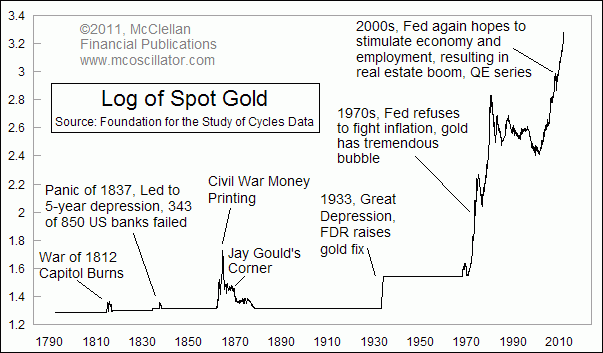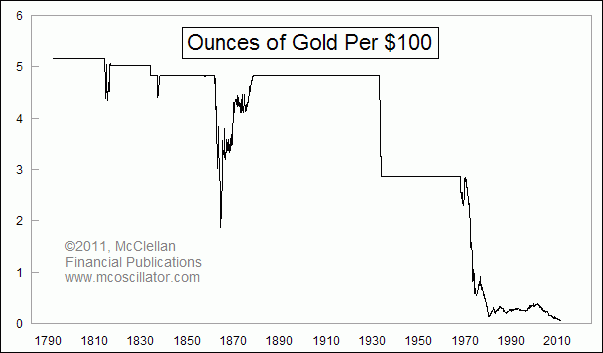by Tom McClellan
That headline is nothing new to most
people, but you may never have seen such a long term view of gold prices
before. This week’s chart looks all the way back to 1792 at the value of gold
expressed in dollars per ounce. If we assume that gold’s real value stays
constant over time, and that its price is a statement about the value of the
dollar, then this chart is a good representation of the debasement of the dollar
by virtue of how many more dollars it takes to buy an ounce of gold.
It is called “debasement” because when it
happens, ‘de value of ‘de dollar goes down to ‘de basement.
We have been going through a financial
crisis since 2007 when the real estate bubble collapsed, and the Fed’s efforts
to resuscitate the economy have tripled the price of gold from its early 2007
levels. But the rise in gold prices was going on since 2001, long before anyone
ever heard of “quantitative easing”.

Looking at this
long term chart also allows us to make a visual comparison of this current round
of debasement, and other periods in history when the dollar’s value changed
dramatically. The scaling is logarithmic, which means that each increment of
vertical chart space represents the same percentage move for prices.
Calculating the logarithm of a number means that you are expressing that number
as the exponent by which a base number (10 in this case) has to be raised to
produce that number. So 2 on the Y-axis equates to $100/oz, 3 equates to
$1000/oz, etc.
Being able to see gold prices in this way
puts into perspective the modern round of dollar debasement, compared to other
events in U.S. history. We might think we have it bad now, with unemployment
north of 9%, but that pales in comparison to the estimated 37% unemployment rate
in 1933, and also to the economic difficulties during the U.S. Civil War.
When talking about the price of gold,
people typically use pricing units of dollars per troy ounce. But that
convention is not the only way to look at the comparative value of gold versus
the dollar. This next chart flips that relationship upside down, and looks at
gold’s price measured in ounces per $100. I could have used ounces per $1, but
then there would just be longer decimal numbers in the Y-axis. I did not use
logarithmic scaling on this one.

After the founding of the U.S., a hundred
dollars would buy you 5.16 ounces of gold. Now, it buys you just 0.05405
ounces. Pushing this line down all the way to the basement is great for owners
of gold, but lousy for owners of dollars.
No comments:
Post a Comment